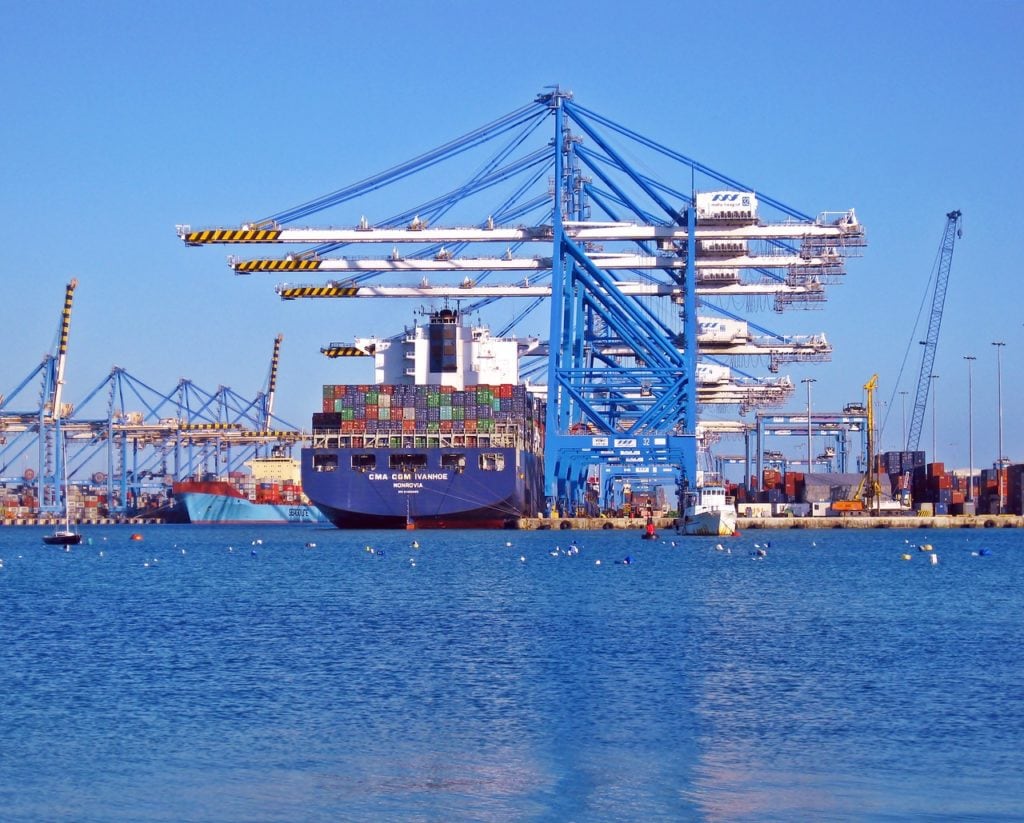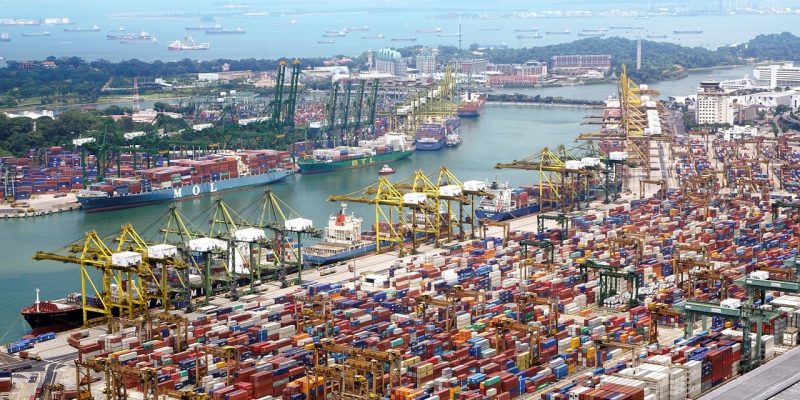Incoterms 2020 Defined
On January 1, 2020, the new Incoterms 2020 went into effect. These new terms were released by the International Chamber of Commerce in Sept of 2019 and set guidelines for how shipments between a seller and buyers in different countries are handled.
As EXW and FOB are the most common we’ll start with those two. Personally, when we ask for initial quotes from manufacturers in our RFQ’s, We request them to quote prices in EXW and FOB. We want to know the EXW price as that is the price of just the product by itself. The FOB to gauge the shipping prices and because the Port is a good place for our freight forwarder to pick up an item. Most of our projects are FOB and we contract with a freight forwarder to complete the rest of the shipping.
Click Here to Access the full Incoterms 2020 infographic
EXW- Ex-Works Incoterm Definition
This is the most basic shipping incoterm term that a supplier can provide. The seller makes the item available to pick up at the factory and is not responsible for the product once it leaves the factory doors. The buyer is responsible for transporting it all the way from the factory and covers all export and import clearances as well as insurance costs.
If you are getting initial quotes from a factory for the first time, then they will almost always give you a quote for EXW, unless you explicitly ask for a quote in another term. The reason factories and supplier quotes in EXW is simply because it’s the lowest price for them and it looks good when you’re comparing quotes and you need the lowest price.
FOB – Free On Board Incoterm Definition
FOB means that the seller ships the goods to the nearest port and the seller is responsible for everything after that. The Seller will drop this off at the port of shipment and the Buyer will either pick it up themselves or more commonly work with a freight forwarder to ship it for them. The seller is the one to clear the goods for export and the buyer is responsible for the good from the port onwards. It’s very important when getting FOB quotes to make sure that you get the name of the port that they are dropping the goods off at.
One of the big reasons that this is the most popular incoterm term used is that the Export port is a good place to have a 3rd party inspection service inspect the goods. Further, the seller is responsible for all activities in the country of export while the Buyer is responsible for all activities once the goods leave the country, which just makes things simple. In addition, most freight forwarders will have an office at or near the port and it’s an easy spot for them to pick up the goods on your behalf.
FCA – Free Carrier Incoterm Definition
This is just one step up from EXW, in which the seller clears the goods for export and delivers the goods to the port of export. The buyer has to unload the goods in the port and is responsible for the goods once they reach the port. The carrier is arranged by the buyer. The biggest difference between EXW is that the seller is obligated to load the goods on the buyer’s Carrier. It should be noted that this is often confused for FOB and if you think there is some confusion feel free to ask your supplier to elaborate and give details.
CPT – Carriage paid to Incoterm Definition
The seller is the one paying for the goods to be shipped to the import port that is chosen by the buyer. The risk is transferred to the Buyer once the goods arrive at the port. The buyer is responsible for unloading the vessel and arranging further transportation from there. Even though the seller is responsible for the cost to the Export port, the buyer assumes the risk and insurance cost once the goods are unloaded at the Export port. The seller is responsible for export clearance, freight costs.
CIP – Carriage and Insurance paid to Incoterm Definition
Effectively the same as CPT except that the seller is required to obtain insurance for the goods during transit. CIP also covers all modes of transportation while CIF is specifically for sea freight. It should be noted that CIP and CIF are the only two methods in which risk and insurance are different. Once the goods are unloaded at the export port The seller assumes the insurance cost, but not the risk until goods are unloaded at the import port.
DPU – Delivery Place Unloaded Incoterm Definition
This Incoterm is new for 2020 and replaces DAT. The Seller delivers the goods (unloaded) to the import port, and the buyer is responsible for the cost and risk of the goods from that point on. The seller takes on all risks or costs associated with the goods until it reaches the import port. The Buyer pays all imports and Customs Fees.
DPU (Delivery Place Unloaded) replace DAT (delivery at Terminal), in the incoterms 2020. This is the only newly named term in the guide, and the term is erectly exactly the same, just with clearer language and rules. The obligations of the Buyer and Seller are exactly the same in both DP and DAT.
The ICC viewed the change as necessary as you cannot unload goods at the dock, port or airport, so they needed to make it clear that it could only be unloaded after the goods had been cleared by customs and had arrived at a final destination such as a warehouse.
DAP – Delivered at Place Incoterm Definition
The Seller delivers the goods to the final destination of the buyer. The seller assumes all risks with the shipping and either load or pays a third party to load the goods for shipment. The Buyer is only responsible for paying customs fees and clearing the goods for clearance. The buyer also pays to unload the goods at the final destination.
DDP – Delivered Duty Paid Incoterm Definition
In these terms, this basically means that the seller pays for and is responsible for everything. The seller pays all costs and assumes all risks to the final destination. The buyer is only responsible for unloading the goods once they arrive at the final destination as chosen by the buyer.
We often get asked, why don’t you just get every project DDP? I will say it is the easiest for the buyer, but it will not be the cheapest. The Seller is the one that picks the shipping company and will choose the one they like best and not the cheapest or most reliable. You are putting a ton of trust in the shipping company. If you want I would suggest you get a quote for DDP from your supplier than get a quote for FOB and a quote from a freight forwarder and compare the final total price of the two.

Note: FOB, FAS, CFR, and CIF are specifically for waterway based shipments (both ocean and inland waterways) while the above are for all forms of shipping including water. Other forms of transportation can include rail, trucking, or air cargo.
FAS – Free Alongside Ship Incoterm Definition
The Seller is responsible for delivering all goods to the side of the vessel at the named export port. The seller pays for and assumes all risks until the goods are placed in the port and the seller clears the goods for export. The Buyer then takes on all cost and risk from that point on, including loading the ship. This has one less step than FOB, in which the bears the cost and risk of loading the ship.
CFR – Cost and Freight Incoterm Definition
The seller is responsible for bearing the cost of shipping til the named import port however the risk is given to the buyer once the goods are loaded onto the ship at the export port and final delivery of goods from the destination port. It should be noted that this is effectively the same as CPT above except that CFR is specifically for water-based transport.
CIF – Cost Insurance and Freight Incoterm Definition
Effectively similar to the one above except that the buyer will require the seller to take on the risk or obtain insurance on the goods until the destination port. The seller bears all costs of shipping and assumes the risk of the goods until the destination port. The seller is also responsible for clearing customs but the buyer is responsible for paying the duty. Again this is effectively the same as CIP except CIF is specifically for water.
Final Thoughts Incoterms Definition
The changes between Incoterms 2010 and Incoterms 2020 are fairly minor when compared to years past. DPU is the new Incoterm introduced this year. As always though, it’s important that you understand what the new incoterms 2020 mean so that you can use it in your shipping and manufacturing plan. If you need any assistance, feel free to check out our DIY Sourcing Kit.





8 thoughts on “Incoterms 2020 Defined // What does EXW, FCA, FOB, DAP, DPU, DDP, CPT, CIP, CIF, CFR, or FAS Mean?”
It is easy to see when reading the rest of your blog post comments lots of people have lots of different and strong debates about this subject. The truth is it is refreshing to meet different opinionated writers Oh yes I bookmarked this post to my FB favorites.
I enjoy what you guys tend to be up to. Such clever work and exposure! Keep up the excellent works guys I’ve added you guys to the blogroll.
Great article! thanks for writing!
Really? Wow, this was very helpful.
Happy friendship day
It’s going to be ending of mine day, except before ending I am reading this
fantastic article to increase my knowledge.
Hi, cool article
RTM Lines specializes in Break Bulk Cargo Shipping Logistics Your International Ocean Freight Break Bulk Cargo Shipping and Logistics can be managed from port to port.